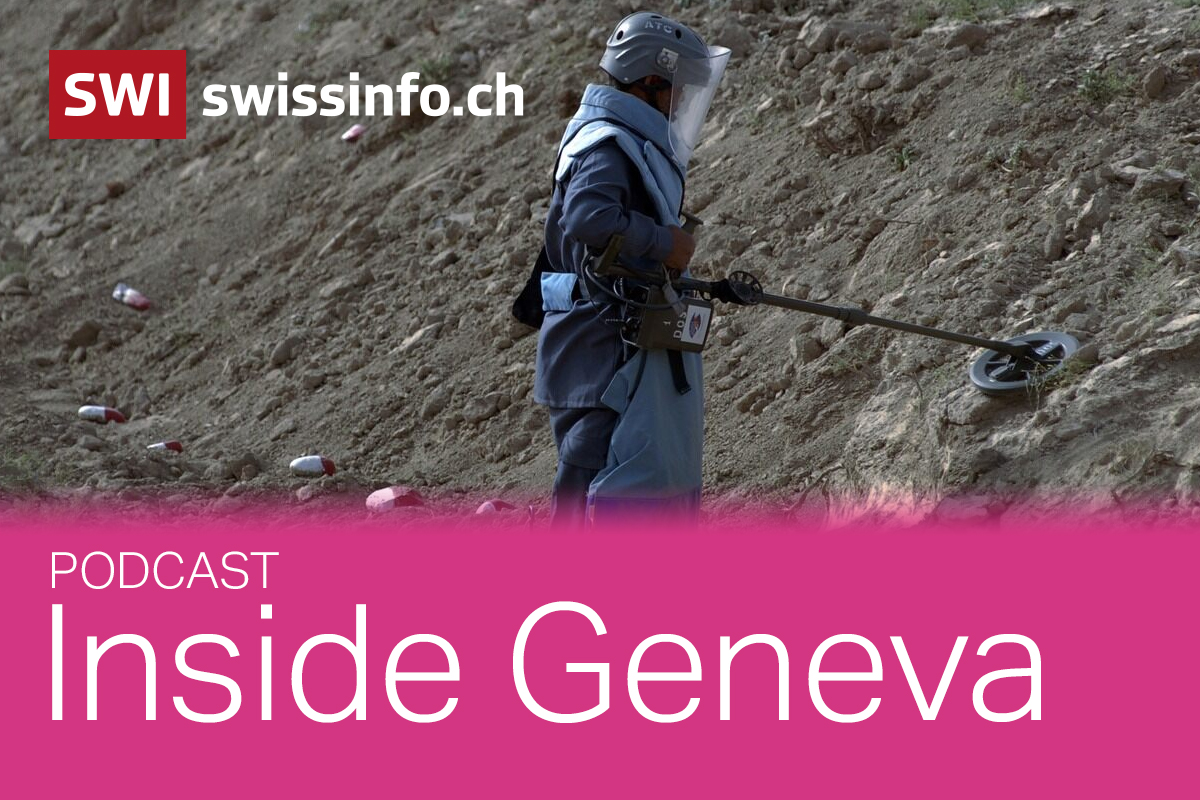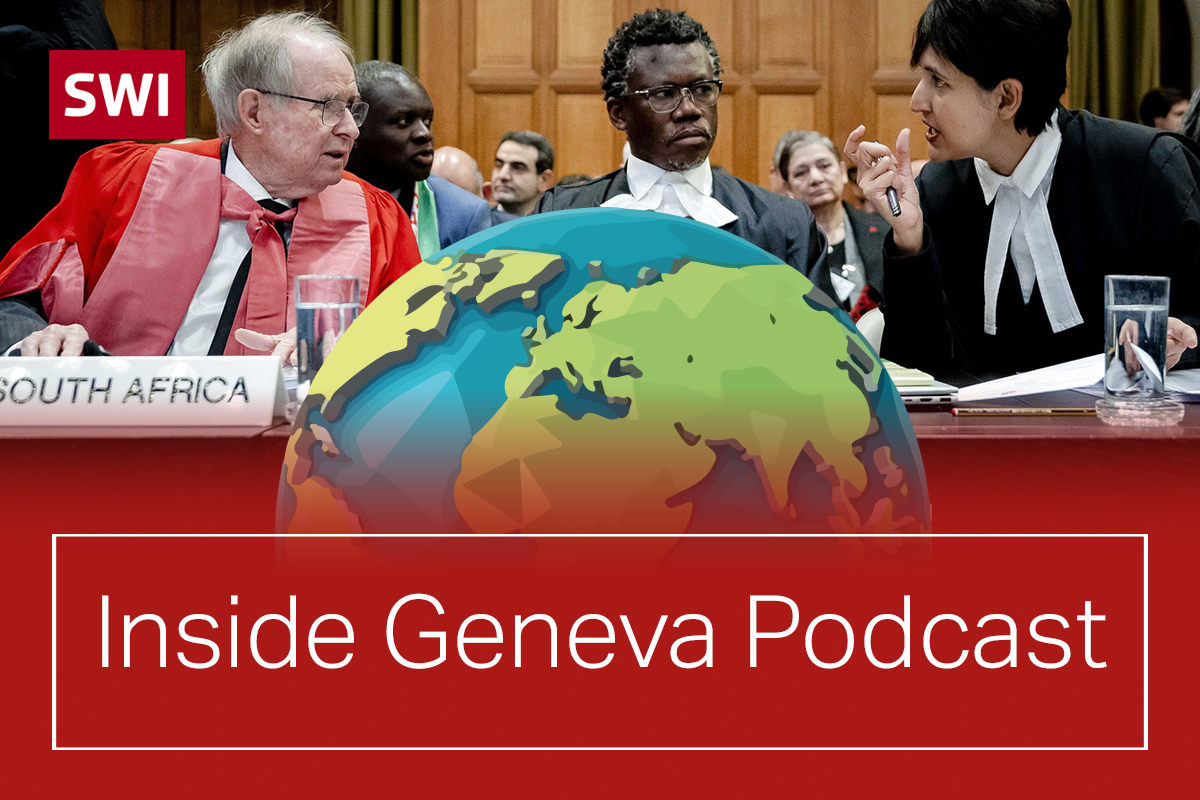
The dangers of a pick and mix approach to international law
There’s been some lively debate about international law recently, and, with it, a lot of misinformation, disinformation, and politicisation. Listening to some politicians talk about International Criminal Court (ICC) prosecutor Karim Khan’s request for arrest warrants on Israeli and Hamas leaders, you would think the ICC was a campaign tool, rather than an independent body whose sole purpose is to uphold international law.
Save the Date for a live recording
We’d like to invite you to a live recording session of our Inside Geneva podcast about the role of the Geneva Conventions and international law. Mark your calendars – June 5, 2024, from 12:30 to 13:30 – at the Geneva Graduate Institute. Registration is required to secure your spot here.External link If you have any questions, please email us at event@swissinfo.ch.
Here in Geneva, many of us are probably increasingly frustrated at the pick and choose, fast and loose approach to the fundamental rights and principles the world agreed to, in what now seems a very unusual moment of cooperation, following the horrors of the second world war.
But outside the Geneva bubble, there are growing signs that, 80 years later, our collective memory of just why we united around the Geneva Conventions, around the Universal Declaration on Human Rights, on conventions on refugees, or against torture, is fading. Younger generations, particularly those who have had the privilege of a life free of conflict, may no longer see the relevance.
Populist leaders shamelessly speak of international law as a nuisance, an infringement of spurious sovereignty, when it suits their political agenda. Witness the way some have condemned the workings of the ICC and the ICJ over the courts’ concerns about the war in Gaza, but have praised the same courts to the skies for deeming Russia and its leaders to have violated international law.
How we got our laws and conventions
Regular listeners to Inside Geneva will know that we regularly take a look at the standards humanity has set itself, and ask if we are living up to them. In June, we will put the question very bluntly, getting international lawyers, young people, and the guardian of the Geneva Conventions, the International Committee of the Red Cross, around the table to ask whether international law is, in effect, dead.
Before that, in this week’s episode, we bring you highlights of some of our earlier coverage, looking at aspects of international law which have truly made the world a better place, and talking to the people who campaigned for those laws.

More
Inside Geneva: the laws that changed the world, and the people who fought for them
A key convention, adopted in the aftermath of the second world war, is the convention against genocide. Defined as the deliberate destruction of a group, in whole or in part, genocide remains today the most shocking, the most unthinkable of crimes. The term tends to be used, by international lawyers and by human rights groups, very sparingly, in part because the legal definition is so precise.
But, in our Inside Geneva podcast of April 2021, former Human Rights Watch Director Ken Roth warns that our horror of the term genocide can blind us to other very serious violations. “People tend to look at genocide as the sole definition of what’s really really bad”, Roth told me. “People feel like, if you don’t call it genocide, then it’s not serious, and that’s a mistake.”
And, as the Geneva Graduate Institute’s professor of international law Paola Gaeta pointed out, “we have a convention against genocide, but not one against crimes against humanity.”

More
Inside Geneva: a look into South Africa’s genocide case against Israel
Given the renewed attention to what is, is not, or just might be, genocide at the moment, that episode is well worth another listen.
A weapon that blighted lives
A more recent convention, and one that owes its existence to the tireless work of campaigners, many of them humanitarian workers, is the Ottawa Convention against landmines. In December 2020 we heard from the ICRC’s Alberto Cairo, who has dedicated his life to working with landmine survivors in Afghanistan. On Inside Geneva, he recalled his arrival in Kabul in 1990. “The very day that I entered the hospital for war victims, I realized that all these patients were without one, or two, legs.”

More
Inside Geneva: The global treaty that has saved thousands of lives
Earlier than that, nurse Denise Coughlin was working on the Thai Cambodia border, and remembered “Every day, just about, somebody was injured by a landmine, and they were rushed off to Khao-I-Dang hospital to have their legs amputated.”
The outrage of medical professionals working in conflict zones, the determination of landmine survivors, and the tireless campaigning of human rights groups finally shamed governments into action, and in 1997 the convention against landmines came into force. It is one of the most ratified conventions of all, and is widely regarded as having saved thousands of lives. And even though the big powers (the United States, Russia, and China) have not backed the convention, the stigma associated with these weapons means they are, today, rarely used or produced.
Nevertheless, we should not forget the permanence of the damage done, as my colleague Stuart Hughes, who lost his leg in Iraq, reminds us. “Every morning when I get up in the morning I put on my artificial leg. That’s something that I will do every day for the rest of my life.”
The torture of not knowing
Our final international law highlight in this week’s podcast comes from an episode first released in May 2021, looking at the Convention against Enforced Disappearances (

More
Global treaty: Defending the disappeared
We hear from Aileen Bacalso, whose husband was snatched from the streets of Manila, bundled into an unmarked car, and disappeared. He was, eventually, returned, but not before Aileen and her family had endured weeks of fear and misery.
As the UN expert on enforced disappearances Olivier de Frouville tells Inside Geneva “That’s why we describe also for the relatives, who are victims of enforced disappearances, we describe it as torture, because this is real torture.”
And Cordula Droege of the ICRC, which backed the convention, points out that ‘victims of enforced disappearances are not only those who are disappeared but also those who suffer directly from it, such as the relatives.’
The convention is one of the most recent additions to our body of international law, it came into force in 2010, and, up to now, just 71 countries have ratified – a somewhat disappointing figure if we consider just how cruel the act of enforced disappearance is.
But it too is a convention which offers support to the families of the disappeared – they can take their cases directly to the UN, and the committee on enforced disappearances can, de Frouville says, request information ‘within hours’ from the authorities in the country where the disappearance has taken place.
It doesn’t always work, of course, but sometimes it does. It also allows countries, under the principle of universal jurisdiction, to prosecute people on their territories who are suspected of having carried out enforced disappearances.
So, is international law dead? The conventions discussed in this week’s podcast would suggest not. But for international law to survive, we need to have respect for it. Is that what has died? Don’t miss our next Inside Geneva, out on June 11th!
🔗 Please register here to attend: https://lnkd.in/esT_PbweExternal link

In compliance with the JTI standards
More: SWI swissinfo.ch certified by the Journalism Trust Initiative
















![The four-metre-long painting "Sonntag der Bergbauern" [Sunday of the Mountain Farmers, 1923-24/26] had to be removed by a crane from the German Chancellery in Berlin for the exhibition in Bern.](https://www.swissinfo.ch/content/wp-content/uploads/sites/13/2025/12/01_Pressebild_KirchnerxKirchner.jpg?ver=a45b19f3)











You can find an overview of ongoing debates with our journalists here . Please join us!
If you want to start a conversation about a topic raised in this article or want to report factual errors, email us at english@swissinfo.ch.